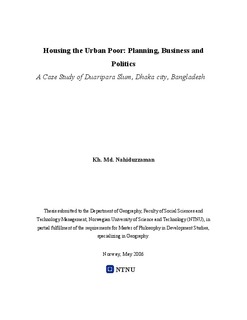Housing the Urban Poor: Planning, Business and Politics: A Case Study of Duaripara Slum, Dhaka city, Bangladesh
Master thesis
Permanent lenke
http://hdl.handle.net/11250/265270Utgivelsesdato
2006Metadata
Vis full innførselSamlinger
- Institutt for geografi [1097]
Sammendrag
This study is conducted on Duripara slum of Dhaka city which is one of the fastest growing megalopolis and primate cities not only among the developing but also among the developed countries. The high rate of urbanization has posed a challenging dimension to the central, local govt. and concerned development authority. In Dhaka about 50% of the total urban population is poor and in the urbanization process the poor are the major contributors which can be characterized as urbanization of poverty. In response to the emerging urban problems, the development authority makes plan to solve those problems as well as to manage the urban growth. By focusing on the housing issue for the urban poor in Dhaka Metropolitan Development Plan (DMDP), this study is aimed to find out the distortion between plan and reality through making a connection between such planning practice, political connections and business dealings.
Knowledge gained from the reviewed literature, structuration theory, actors oriented approach, controversies of urban growth and theoretical framework were used as interpretative guide for the study. The data set for this study were collected both from primary and secondary sources. The primary sources include data collected through semi-structure questionnaire survey administered to 60 households using non-random judgmental sampling method. Moreover, interview guides, group discussion and personal observation were also used to synergize the study objectives. In addition to primary sources, secondary sources were used when relevant. The study used both qualitative (content analysis) and quantitative methods like descriptive statistics to summarize the results of the study. In DMDP, it was recommended that the urban poor will be relocated to the urban fringe areas with tenure security. This study found that these recommendations are not practical and implementable, at all, in relation to current socio-economic characteristics of the slum dwellers, land management system, transport facilities and political practice. The slum dwellers are highly mobile in choosing their place of residence and their choice is determined, to a greater content, by close proximity to work place and travel cost. This study discovered that a patron-client relationship has been existing in the study area where the political leaders play the major role to control over the slum and thereby their lives. Under the feudalistic social structure the poor are only able to use their limited form of agency for the survival. Whilst, in the urban fringe, almost all the lands are in the grip of private land developers, local elites etc. who have strong relation with the powerful political leaders and where land acquisition cost by the development authority is fairly high.
In general, in and around Dhaka public transport system is very poor and costly which eventually discourages people to live away from their work places. From the findings of this study it is revealed that there is a clear pattern of urban pockets of small scale industries and small scale slum and squatter settlements. There is as such no direction and guideline regarding the development of transport infrastructure facilities commensurate with the recommendations. The politicians are most pervasive actors in all spheres of development activities. They misuse the power to influence any decision of the public agencies in favor of their business interests. They are the well known businessmen and the other businessmen have to keep a good relation with them in order to gain financial benefits. From the findings of this study it was discovered that many of the owners of the private land developers and private consulting firms are politicians. Moreover, these political elites have strong influence on the officials of different public agencies as those officials have been appointed by the recommendations of those national elites. All over, there is a business relationship between these politicians, officials of public agencies and businessmen themselves where plan like DMDP is a mean for business. Under such structure and practice, the poor are the victims who are becoming aliens in the urban social geography.
